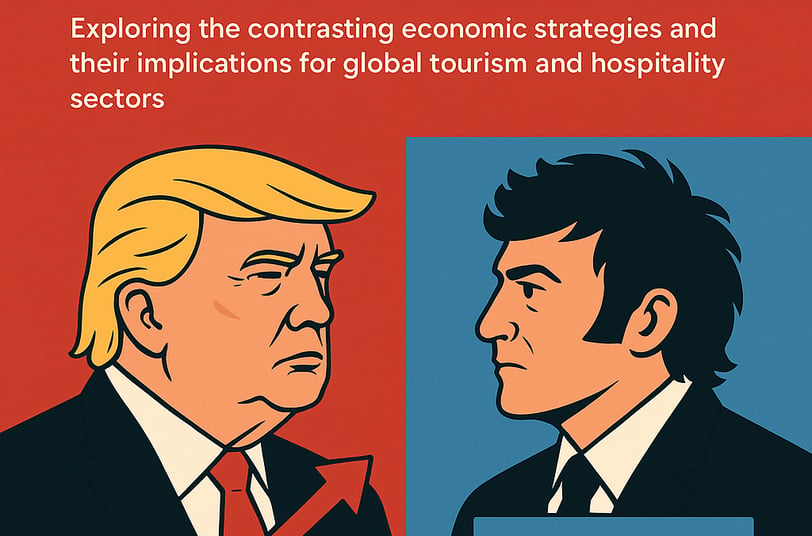Economic Policies and Tourism | Trump 2025 vs. Milei’s Argentina
This is a brief exploration of the contrasting economic strategies of Donald Trump's renewed "America First" tariff-driven agenda and Javier Milei's bold libertarian reforms in Argentina. With historical examples illustrating the impacts of protectionism versus free-market liberalization, the discussion highlights how these policies influence the global hospitality and tourism sectors, offering valuable insights for businesses navigating today's evolving economic landscape.
MENTAL MEANDERINGS
James Hague
4/5/20253 min read


Whether we’re talking full-service hotels in Banff or boutique resorts in Buenos Aires, our industry often feels the immediate effects of major economic changes. Two figures currently driving global discussion—and that I personally find fascinating—are Donald Trump and Javier Milei, Argentina’s libertarian powerhouse shaking up South America. Their reforms, backed by a significant segment of leading Republicans, are set to influence everything from travelers' booking decisions to how hotels plan pricing strategies.
Reflecting on this, I can't help but question: Can the U.S. withstand another dramatic shift in its global perception? Historically, America was seen as the undisputed "leader of the free world," a shining symbol for freedom and the free market. Trump’s renewed approach, however, has many wondering if that reputation is becoming increasingly tarnished.
Trump’s Tariffs: Déjà Vu or Bold Strategy?
Trump’s return to office in 2025 revives the bold and fiercely nationalist “America First” agenda. There’s an undeniable appeal to this approach—after all, who doesn't find some charm in national pride? Yet, the economic implications are complex, especially for tourism.
Trump is aggressively ramping up tariffs, aiming to shield domestic industries from global competition. Historically, however, protectionist tariff strategies—such as the infamous Smoot-Hawley Tariff Act of 1930—have triggered economic setbacks, retaliatory tariffs, and strained international relationships, contributing significantly to the severity of the Great Depression.
Today, these tariff wars similarly impact international relations, exchange rates, and traveler confidence. Canada, interestingly, finds itself in a unique position. If tariffs weaken our dollar, Canadian tourism might benefit substantially, attracting foreign visitors seeking better value. Additionally, we might see increased international business events and leisure tourism as travelers perceive Canada as a more welcoming alternative to the increasingly isolated U.S.
China has predictably responded with retaliatory tariffs, while the European Union signals its preparedness to reciprocate. Even our own Prime Minister Carney recently made a poignant declaration: "If the U.S. no longer wants to lead, Canada will." This diplomatic posture hints at Canada's readiness to step into a more assertive international leadership role, possibly boosting our global tourism appeal as an inclusive, open, and stable destination.
Milei’s Free-Market Revolution: Risk and Reward
Across the globe in Argentina, President Javier Milei has embarked on a radical free-market revolution reminiscent of Margaret Thatcher’s UK reforms in the 1980s. Regardless of one's initial skepticism, Milei's economic turnaround can't be overlooked. He has rapidly emerged as an icon of effective libertarian economics, dramatically reducing inflation, bolstering employment rates, and spurring GDP growth.
Milei's approach has been to decisively slash government spending, swiftly eliminate fiscal deficits, and liberate the Argentine peso from crippling currency controls. Initially, this created a period of instability—hoteliers and travelers alike hesitated amid surging inflation and uncertainty. But as the reforms stabilized, Argentina quickly evolved into a thriving market with newfound international appeal. Lower inflation has not only improved everyday life but has also made Argentina significantly more attractive for international tourists and investors.
By aggressively reducing trade barriers and tariffs, Milei is encouraging robust foreign investment across sectors critical to tourism—from wineries in Mendoza to upscale eco-lodges in Patagonia. As global investors rediscover Argentina's immense tourism potential, hospitality projects are flourishing. A crucial question remains: will domestic purchasing power recover quickly enough to bolster internal tourism? If Argentina’s working and middle classes continue to enjoy improved financial stability, the hospitality sector can anticipate sustained occupancy and steady revenue growth year-round.
Navigating a Shifting Global Landscape
Comparing Trump and Milei reveals two distinct economic visions: Trump's nationalist protectionism versus Milei's daring embrace of the free market. History has repeatedly illustrated the drawbacks of aggressive tariffs, suggesting Trump’s strategy might once again provoke economic turbulence and international alienation, despite its short-term nationalist appeal.
Conversely, Milei’s open-market policies echo successful historical precedents like post-war Germany’s economic miracle (the "Wirtschaftswunder") and Thatcher’s Britain. Both cases demonstrated the power of reduced governmental intervention and free trade to swiftly stimulate economic recovery and growth. In this context, Milei’s Argentina could serve as a contemporary case study reinforcing the benefits of economic liberalization.
Ultimately, these contrasting strategies highlight vital lessons for hospitality professionals. Trump’s America-first stance may inadvertently boost Canadian tourism, at least in the short term. At the same time, Milei's Argentina signals broader opportunities for investment and market expansion within the hospitality sector. As these leaders reshape global economic dynamics, hospitality businesses will do well to stay agile, attentive, and ready to adapt to these evolving landscapes.
